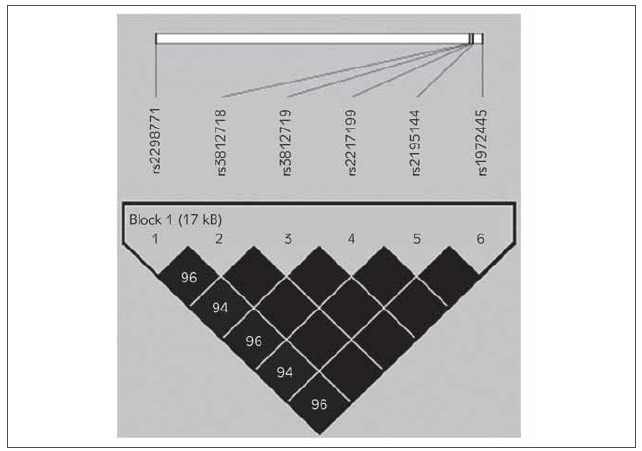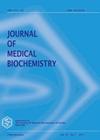SCN1A多态性影响约旦癫痫患者的抗癫痫药物反应性。
IF 2
4区 医学
Q4 BIOCHEMISTRY & MOLECULAR BIOLOGY
引用次数: 0
摘要
背景:本研究的目的是评估电压门控钠通道α亚基1 (SCN1A)基因多态性是否影响约旦癫痫患者对抗癫痫药物(aed)的反应性。方法:采用聚合酶链反应(PCR)对72例aed治疗的癫痫患者SCN1A rs2298771、rs3812718、rs3812719、rs2217199、rs2195144和rs1972445 6个单核苷酸多态性(snp)进行基因分型。比较耐药患者和耐药患者的基因型和等位基因分布。检测了6个单倍型,并评估了连锁不平衡(LD)。结果:耐药组和药敏组基因型均符合Hardy-Weinberg平衡。SCN1A基因的三种遗传多态性似乎在等位基因和基因型水平上影响对aed的抗性。数据显示,rs2298771 G等位基因、rs3812719 C等位基因和rs2195144 T等位基因增加了aed耐药的风险(OR=2.9;95%CI= 1.4 ~ 5.9, p=0.003;或= 2.4;95%置信区间= 1.2 - -4.7,p = 0.01;或= 2.3;95%CI=1.2 ~ 4.7, p=0.01)。对SCN1A多态性的单倍型分析显示,高度LD与抗aed相关。rs2298771、rs3812718、rs3812719、rs2217199、rs2195144和rs1972445的GCCATG单倍型存在协同效应,且具有高度显著的相关性(OR=2.8;95%可信区间-6.2 = 1.5,p = 0.002)。结论:数据表明,SCN1A多态性可能影响约旦癫痫患者对aed的抗性,其位点为3个snp (rs2298771;rs3812719;rs2195144)。此外,单倍型分析表明,六个SCN1A多态性之间存在相当程度的LD。需要更大样本量的进一步调查来证实当前研究的结果。本文章由计算机程序翻译,如有差异,请以英文原文为准。

SCN1A polymorphisms influence the antiepileptic drugs responsiveness in Jordanian epileptic patients.
Background The aim of this study was to evaluate whether the voltage-gated sodium channel alpha subunit 1 (SCN1A) gene polymorphisms influence the responsiveness of Jordanian epileptic patients to antiepileptic drugs (AEDs). Methods A total of 72 AEDs-treated epileptics were polymerase chain reaction (PCR)-genotyped for six single nucleotide polymorphisms (SNPs), including SCN1A rs2298771, rs3812718, rs3812719, rs2217199, rs2195144 and rs1972445. Genotype and allele distributions in drug-responsive and drug-resistant patients were compared. The six SNPs haplotypes were examined, and the linkage disequilibrium (LD) was assessed. Results The genotypes of drug-resistant and drug-responsive groups were in Hardy-Weinberg equilibrium. Three genetic polymorphisms of the SCN1A gene seemed to influence the resistance to AEDs, on the level of alleles and genotypes. Data revealed that rs2298771 G allele, rs3812719 C allele, and rs2195144 T allele increased the risk of developing AEDs-resistance (OR=2.9; 95%CI= 1.4-5.9, p=0.003; OR=2.4; 95%CI=1.2-4.7, p=0.01; OR=2.3; 95%CI=1.2-4.7, p=0.01), respectively. Haplo type analysis of SCN1A polymorphisms revealed high-degree LD associated with resistance to AEDs. A synergetic effect appears with highly significant association in GCCATG haplotype of rs2298771, rs3812718, rs3812719, rs2217199, rs2195144, and rs1972445 respectively (OR=2.8; 95%CI=1.5-6.2, p=0.002). Conclusions Data suggests that SCN1A polymorphisms could influence the resistance to AEDs in Jordanian epileptics at three SNPs (rs2298771; rs3812719; rs2195144). Additionally, haplotype analysis indicated a substantial degree of LD between the six SCN1A polymorphisms. Further investigation with larger sample size is needed to confirm the results of the current study.
求助全文
通过发布文献求助,成功后即可免费获取论文全文。
去求助
来源期刊

Journal of Medical Biochemistry
BIOCHEMISTRY & MOLECULAR BIOLOGY-
CiteScore
3.00
自引率
12.00%
发文量
60
审稿时长
>12 weeks
期刊介绍:
The JOURNAL OF MEDICAL BIOCHEMISTRY (J MED BIOCHEM) is the official journal of the Society of Medical Biochemists of Serbia with international peer-review. Papers are independently reviewed by at least two reviewers selected by the Editors as Blind Peer Reviews. The Journal of Medical Biochemistry is published quarterly.
The Journal publishes original scientific and specialized articles on all aspects of
clinical and medical biochemistry,
molecular medicine,
clinical hematology and coagulation,
clinical immunology and autoimmunity,
clinical microbiology,
virology,
clinical genomics and molecular biology,
genetic epidemiology,
drug measurement,
evaluation of diagnostic markers,
new reagents and laboratory equipment,
reference materials and methods,
reference values,
laboratory organization,
automation,
quality control,
clinical metrology,
all related scientific disciplines where chemistry, biochemistry, molecular biology and immunochemistry deal with the study of normal and pathologic processes in human beings.
 求助内容:
求助内容: 应助结果提醒方式:
应助结果提醒方式:


